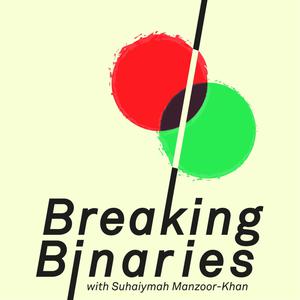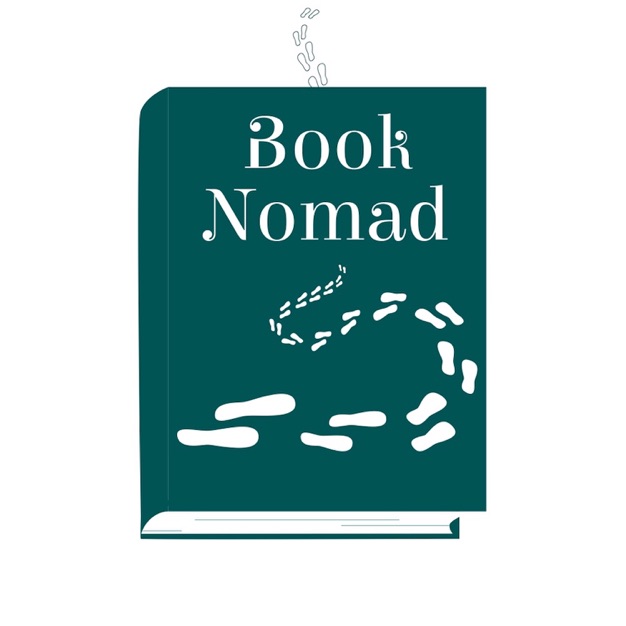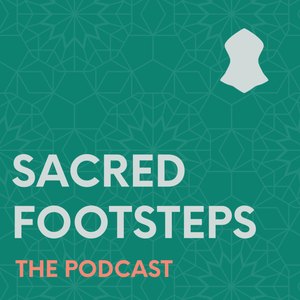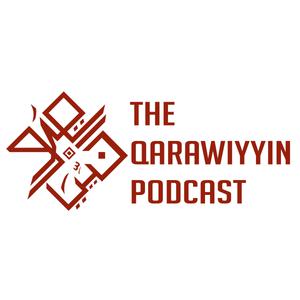
Breaking Binaries
Suhaiymah Manzoor-Khan
- 59 minutes 44 secondsNecolonial/Postcolonial with Vanessa Tsehaye
In Episode 9 of Season 2, Suhaiymah Manzoor-Khan breaks down the binary of Neocolonial and Postcolonial states with Vanessa Tsehaye.
Vanessa Tsehaye is an Eritrean human rights activist who was born and raised in Sweden. She founded the organisation One Day Seyoum when she was in high school to continue the work of her uncle Seyoum Tsehaye, a journalist who has been imprisoned without a trial in Eritrea since 2001. One Day Seyoum is today one of the largest youth organisations fighting against human rights abuses committed against the Eritrean people, both still in the country and after they flee. She holds a law degree from SOAS, University of London and currently serves as Amnesty International’s campaigner for the Horn of Africa.
In this episode Vanessa helps dismantle the reductive way formerly colonised states are seen. How do the ways we glorify postcolonial states or condemn necolonial relations impact the people on the ground? Through her work to better the lives of Eritreans we unpicked the rhetoric that hides human rights abuses and obscures the displacement of so many people made refugees and harmed by borders. We ask what criteria we should use to extend support for states across the world, and how might we better understand dynamics of statehood?
For more information on One Day Seyoum's Eritrean Refugee Centre click here.To read the transcript of this episode instead, follow this link: https://www.suhaiymah.com/breaking-binaries-transcripts.
27 February 2021, 7:00 am - 1 hour 1 minuteSecularism/Religion with Suhraiya Jivraj
In Episode 8 of Season 2, Suhaiymah Manzoor-Khan discusses the binary of Secularism and Religion with Suhraiya Jivraj.
Suhraiya is author of The Religion of Law: Race, Citizenship and Children's belonging and interested in interrogating terms such as 'religion' and 'secularity' through government law and policy. She has a background working for human right NGOs and grassroots orgs and now teaches and researches in areas of Public law, as well as Decolonial Approaches to law and social justice.
In this episode Suhraiya helps dismantle one of the most taken for granted binaries around: secularism and religion. Where do these terms come from? Have they always been around? Who gives them meaning? Do the specific histories that shape them impact our understanding of them as universal ideas? How universal they really are? and what is the impact of normalising them?
To read the transcript of this episode instead, follow this link: https://www.suhaiymah.com/breaking-binaries-transcripts.
6 February 2021, 7:00 am - 54 minutes 49 secondsFake News/Truth with Maryam Jameela
In Episode 7 of Season 2, Suhaiymah Manzoor-Khan discusses the binary of Fake News and Truth with Maryam Jameela.
Maryam is a writer and researcher with a background in academia, working in researching trauma, Islamophobia, and power structures. She's recently started working for the Canary as an investigative journalist, and her work can also be found via her Twitter handle, @yammatron.
In this episode Maryam helped dismantle the rhetoric around 'combating Fake news' by considering the terms of the conversation itself, what constitutes 'fake' and how we go about declaring what is 'true'. Is there such thing as 'true' representation, if there is 'false' representation? Are historical narratives ever entirely true or false? How does this binary play into our very ideas about what knowledge and information are?
To read the transcript of this episode instead, follow this link: https://www.suhaiymah.com/breaking-binaries-transcripts.
23 January 2021, 6:28 am - 59 minutes 51 secondsVictim/Perpetrator with Kristen Cherry
In Episode 6 of Season 2, Suhaiymah Manzoor-Khan discusses the binary of Victim and Perpetrator with Kristen Cherry.
Kristen is a survivor advocate and a movement worker based in Louisville, Kentucky, in the USA. She worked at her local domestic violence/sexual assault crisis center for 2 ½ years, counseling survivors in shelter, over the crisis line, and through the court process after filing for civil protection orders. Kristen is currently involved in community organising efforts in Louisville as protests continue following the police killing of Breonna Taylor in 2020, that has included co-coordinating a protest arrest hotline, which provides support to protestors facing charges and connects them with free legal support.In this episode Kristen helped to shed light on the ways victim/perpetrator hides the contexts that produce violence, and enables them to go uninterrogated. Should violence be understood as an inherent part of someone, and equally, should being victim to it? How can we center survivors and healing, as well as create outcomes that lead to accountability and justice rather than merely offer incarceration as the solution to violence?
The book mentioned by Kristen is Beyond Survival: Strategies and Stories from the Transformative Justice Movement. ed. Leah Lakshmi Piepzna-Samarasinha and Ejeris Dixon.
To read the transcript of this episode instead, follow this link: https://www.suhaiymah.com/breaking-binaries-transcripts.
9 January 2021, 6:30 am - 51 minutes 4 secondsBritish Empire/British Nation with Nadine El-Enany
*BONUS EPISODE*
In Episode 5 of Season 2, Suhaiymah Manzoor-Khan discusses the binary of Britain as empire and Britain as nation, with Nadine El-Enany.Nadine El-Enany is Reader in Law at Birkbeck School of Law and Co-Director of the Centre for Research on Race and Law, she teaches and researches in the fields of migration and refugee law, European Union law, protest and criminal justice. Nadine has written for the Guardian, the LRB Blog, Pluto Blog, Verso Blog, Open Democracy, Media Diversified, Left Foot Forward and Critical Legal Thinking. Her book, (B)ordering Britain: law, race and empire (2020) was published by Manchester University Press and is the basis of this episode's destruction.
Did Britain ever stop being an empire? Has Britain ever been a truly sovereign, bounded nation-state, or does 2021 mark the first year of it trying to be so? If all Britain's wealth, welfare and institutions are embedded in colonial conquest or infused by its profit, who gets to say what Britain is, or who is "outside it"? This episode's discussion comes as a bonus episode to mark the new year. Whilst we break down the binary, Nadine El-Enany also provides us with a hopeful discussion and reminder that the future is yet to be made, and Britain is "up for grabs".To read the transcript of this episode follow this link: https://www.suhaiymah.com/breaking-binaries-transcripts.
2 January 2021, 6:00 am - 47 minutes 46 secondsDisability/Ability with Anamika Misra
In Episode 4 of Season 2, Suhaiymah Manzoor-Khan discusses the binary of Disability and Ability with Anamika Misra.
Anamika is an Autistic PhD researcher and Assistant Lecturer at Kent Law School. She has previously been involved in the Decolonise the Curriculum Project at Kent and organises with precarious staff and students of colour across a range of social justice issues. Though she’s supposed to have academic expertise in the law of armed conflict and human rights, she finds the language of expertise problematic and prefers to say she’s interested in learning about race, colonialism, disability, sexuality and gender.
This episode's discussion sees Anamika help to break down how the binary of disability and ability is constructed - historically, and ideologically; the ways it is rooted in ideas of human value in relation to capital; how this means we only value ability in relation to capitalistic "value"; how this binary homogenises so many varied experiences into two boxes; and what it would look like to focus more on changing structural and societal dynamics that disable people.
The resources mentioned by Anamika are as follows:
- The Harriet Tubman Collective, @HTCSolidarity on Twitter
- Their statement on disability solidarity
- The Black Disability Collective,@BlackDisability on Twitter
- Autistic Tyla
- AucademyTo read the transcript of this episode instead, follow this link: https://www.suhaiymah.com/breaking-binaries-transcripts.
26 December 2020, 7:00 am - 57 minutes 55 secondsMajority/Minority with Azeezat Johnson
In Episode 3 of Season 2, Suhaiymah Manzoor-Khan discusses the binary of Majority and Minority with Dr Azeezat Johnson.
Azeezat is a research fellow in human geography at Queen Mary University of London. Her current project unpacks the racial history that informs black Muslim women's lives in London. She asks how these women create and embody practices of home whilst navigating the imperial nostalgia and racism that has been exposed through Brexit. She's also the co-editor of The Fire Now: Anti-Racist Scholarship in Times of Explicit Racial Violence.
This episode's discussion centers on how the language of majority and minority flattens differences and power dynamics,and asks what is enabled by framing people as a 'minority', as well as what it does to us when we think about ourselves as 'minorities'.
To read the transcript of this episode instead, follow this link: https://www.suhaiymah.com/breaking-binaries-transcripts.12 December 2020, 6:30 am - 48 minutes 53 secondsFree Speech/Censorship with Sita Balani
In Episode 2 of Season 2, Suhaiymah Manzoor-Khan discusses the binary of Free Speech and Censorship with Dr Sita Balani. Sita is a lecturer in contemporary literature and culture at King's College London. In her research and teaching, she explores the relationship between imperialism and identity in contemporary Britain. Her work has appeared in Feminist Review, Identity Theory, Open Democracy, Photoworks and the Verso blog. This episode's discussion centers on dismantling the straight-forward ways that Free Speech and Censorship are presented to us, and asks whether they're really such clear-cut categories - discussing what it means to be "cancelled" in a context where state censorship is rarely acknowledged as 'cancellation', and what sorts of conversations are obscured when we get stuck in the loop of asking whether certain words or cartoons should/shouldn't be allowed to be published. By discussing a wide range of relevant contexts and histories the binary is dismantled to uncover what it hides, who it protects, and what it obscures.
To read the transcript of this episode instead, follow this link: https://www.suhaiymah.com/breaking-binaries-transcripts.28 November 2020, 8:00 am - 1 hour 25 secondsSeason 2, Episode 1: Fascist/Liberal
In Episode 1 of Season 2, Suhaiymah Manzoor-Khan discusses the incredibly timely binary of Fascist/Liberal with an anonymous guest. The discussion focuses on British and European contexts, interrogating the types of politics and policies that are defined as "fascist" or "liberal", and asking who they do and don't apply to, and whether fascist tendencies are really so distant from liberal ones? By discussing a wide range of relevant contexts and histories the binary is dismantled to uncover what it hides, who it protects, and what it obscures.
To read the transcript of this episode instead, follow this link: https://www.suhaiymah.com/breaking-binaries-transcripts.14 November 2020, 10:05 am - 2 minutes 24 secondsSeason 2 coming out this autumn
Make sure you're caught up with Season 1 before Season 2 drops this autumn iA!
3 October 2020, 10:08 am - 56 minutes 12 secondsPakistani/Balochi with Hanain Brohi
In episode 7 (final episode of Season 1) Suhaiymah discusses the binary of Pakistani/Balochi with Hanain Brohi. She is a PhD candidate in Applied Linguistics at Newcastle University, her study explores sisterhood in Muslim women, and the discourses of Otherness in their everyday lived experiences, she is interested in the use of language as a reflection of socio-cognitive ideologies. The discussion surrounds her Balochi identity and how it is both forced into "Pakistan" but also excluded from it both ideologically and culturally. The conversation connects more broadly to all nation-state boundaries and aks how ethnicity, nationality etc are constructed and what their consequences are.
8 March 2020, 6:16 pm - More Episodes? Get the App
Your feedback is valuable to us. Should you encounter any bugs, glitches, lack of functionality or other problems, please email us on [email protected] or join Moon.FM Telegram Group where you can talk directly to the dev team who are happy to answer any queries.
 American Submitter
American Submitter
 The Amaliah Podcast
The Amaliah Podcast
 Book Nomad: Reading the World
Book Nomad: Reading the World
 Sacred Footsteps - The Podcast
Sacred Footsteps - The Podcast
 The Qarawiyyin Podcast
The Qarawiyyin Podcast
 The Thinking Muslim
The Thinking Muslim